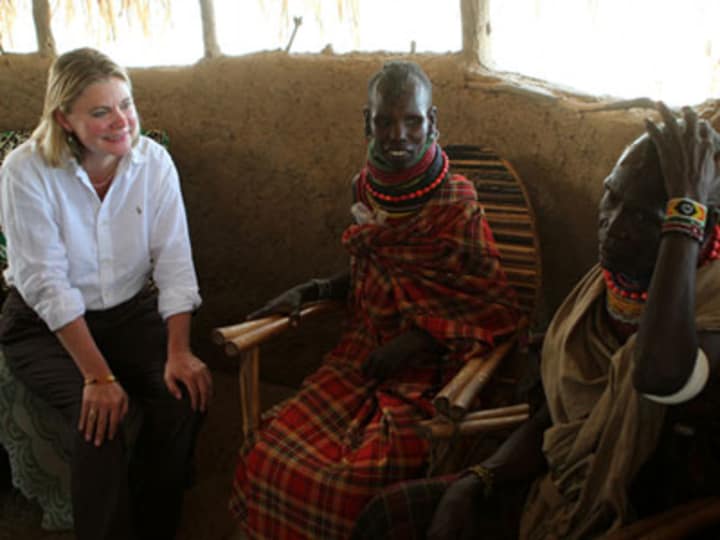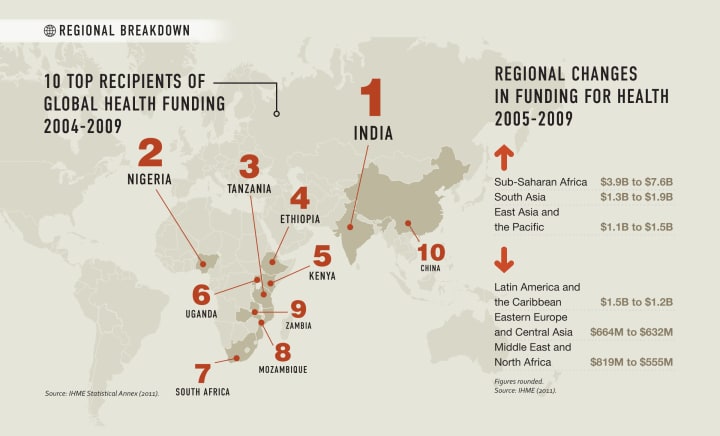
Justine Greening was appointed the United Kingdom’s Secretary for International Development in September 2011 to advance the government’s value-for-money agenda. She talks to Impact about the U.K.’s global health strategy and how the participation of the private sector is essential to deliver the plan in the post-MDG 2015 era.
The U.K. government’s global health strategy focuses on three key areas: global health security, international development and trade for better health. Why?
The “Health is Global” strategy published in 2011 sets out the responsibilities which government departments (beyond the Department of Health) have for delivering health outcomes in the U.K. and internationally. The refreshed strategy shows clear outcomes for research, the management of pandemic flu, health in conflict situations and priorities for improving health in the poorest countries. This is helping departments to invest their efforts in more concrete goals with the greatest impact.
For DFID, this means investing in health programs and research to improve the lives of the very poorest people. For example, we have committed to providing an additional 24 million women access to family planning by 2020, averting 20 million unwanted pregnancies and saving the lives of 42,000 girls and women. And by investing in research and development and countries’ health systems, we are helping the poorest people get access to life-saving medicines.
Bilateral funding for the health sector has steadily increased since 2008. Do you expect this trend to continue? If so, which areas and regions will DFID prioritize?
The U.K. government is committed to improving the health and well-being of the world’s poorest people. After reviewing our bilateral programs in 2010, our bilateral health work has changed to focus on fewer countries with the most need. This means countries affected by conflict or fragility and those not expected to meet the Millennium Development Goals on reducing child mortality, improving maternal health and combating HIV/AIDS, malaria and other diseases.
Since 2009/2010 our bilateral support to the health sector has increased by 30 percent, and last year DFID provided almost £1 billion ($1 billion) in bilateral aid to the health sector. Our priority is spending money in the most effective and efficient way to achieve the most impact. For example, we know that investment in reproductive, maternal and newborn health saves lives and is highly cost-effective. So we have almost tripled aid to these health areas since 2009/2010, placing women and girls at the heart of the U.K.’s development assistance.
One of DFID’s structural reform actions is to boost wealth creation. How can the ripple effects of better health in developing countries translate to the growth of emerging markets and a stronger global economy?
Many developing countries will have growing and more youthful populations over the coming decades. This can be a great opportunity for economic growth, as it enables individuals and countries to participate more fully in the global economy. But this will only happen if people are healthy, educated and have access to meaningful employment.
Unequal access to quality healthcare and education reinforces wider inequities, creating a vicious circle where poor people are less healthy, which limits their life opportunities and their ability to contribute to the economy. A long-term study in Bangladesh found that a family planning program, together with improved support for maternal and child health, led to women being better educated, earning more, and to their families owning more assets. Empowering women in ways like this is crucial to growing economies.

Click the image to view in large size.
Middle-income countries like India, a top recipient of DFID aid in 2012, are becoming donors themselves. What effect do you see these countries having on the development landscape over the next 5–10 years?
It is good that middle-income countries are playing a greater global role in development. Their recent and ongoing experience of domestic poverty reduction can provide useful lessons and approaches for poorer countries. The size and future growth of their economies also means that they can help poorer countries through trade and investment, as well as aid. My hope is that by building partnerships, sharing knowledge and combining experiences with countries like India and others, we will maximize our collective impact on the global development challenges.
Improving the lives of women and girls is also a structural reform action. One trend we see in our data is an increased focus on funding for health interventions targeting girls and women. What types of partnerships or funding mechanisms do you think need to be in place to reach more girls and women with the health products and services they need?
Women and girls are a priority for me and for DFID. DFID supports a wide range of partnerships and mechanisms to meet the health requirements of women and girls, but it is important to encourage country-led plans to address gaps in services. Achieving this requires support from politicians, communities, government partners, the private sector, civil society and academia.
Partnership is cited as key to achieving the goals of the Global Health Strategy. Going forward, what role will the private sector play in supporting DFID’s health projects?
You cannot get sustainable development without the private sector, and you cannot deliver health care in remote and underdeveloped countries without using private-sector supply chains. The private sector and foundations are already key partners with us in many ways. They deliver a large share of health services across the developing world, sit with us on the governing boards of international health funds, make the drugs and treatments that the world needs, are significant donors to global health, and work with us on ways to encourage greater private sector involvement. When polio is finally eradicated, it will be the result of a broad coalition of governments, private foundations, pharmaceutical companies, multilateral agencies and charitable organizations. The private sector will continue to play an increasing part through innovative bodies such as the Affordable Medicines Facility for Malaria, which uses the private sector to provide access to the most effective anti-malaria drugs that even the poorest households can afford, and GAVI, a public-private partnership which brings in financial contributions from private companies and foundations, to solve global health problems.
How does DFID perceive global health in the post-MDG 2015 era?
The post-2015 development framework will shape future foreign assistance and the broader agenda of making progress for the world’s poorest people, and the U.K. is chairing high-level discussions. But while discussions are taking place, the U.K. will continue to support developing countries in achieving the MDG targets up to and beyond 2015. This includes the health needs affecting the poorest people, from neglected tropical diseases to the increasing burden of non-communicable diseases like diabetes.
The health and empowerment of women and girls is particularly important. Comprehensive sexual and reproductive health and rights, particularly for young women, remain critical to meeting the needs of the world’s poorest people. Nevertheless, it is encouraging to see health spending increase, with more countries making commitments to achieve universal health coverage and the private sector improving access to vaccines and medicines. There will remain a need for investment in research to find better tools and technologies, and to reach the people who need them most.
Find out more about the ”Report on Global Giving: A New Era of Philanthropy and Investment in Global Health” by PSI in partnership with Devex and support by Fenton Communications, and sign up to receive PSI’s Impact magazine. Subscribe to The Development Newswire to receive top international development headlines from the world’s leading donors, news sources and opinion leaders — emailed to you FREE every business day.




